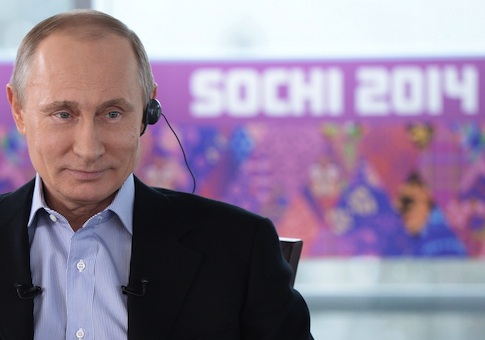The increased capabilities and jihadist ambitions of terrorist groups near Russia has significantly heightened the threat of attacks at the Winter Olympics in Sochi, experts say.
The international community is already on high alert for potential attacks at the games after a series of bombings in recent months in Volgograd killed at least 34. Two men with explosive belts, who identified themselves as Islamist militants from Russia’s northern Caucasus region, claimed responsibility for the attacks in a video and said they had a "present" for Russian leaders and tourists who attend the games.
The Olympics run from Feb. 6-23 in the subtropical port city of Sochi located on the Black Sea, which is about 25 miles north of Russia’s border with Georgia and the North Caucasus.
Juan Zarate, senior counterterrorism adviser for the Center for Strategic and International Studies (CSIS), said at a press briefing on Tuesday that Russian President Vladimir Putin made a "brazen move" placing the Olympics so close to the Caucasus—the hotbed of Islamist discontent with Russia.
CSIS senior fellow Andrew Kuchins called the event a "real showdown" between the Islamist militants and Putin, who wants to parlay the games into international legitimacy and show the world the "new Russia."
Terrorists threatened to disrupt the games as early as last July, when Doku Umarov, a former Chechen nationalist leader who now heads the Caucasus Emirate jihadist group, vowed to avenge Russian conquests of the Caucasus stretching as far back as the 19th century.
There are now contested reports that Umarov has been killed, but Kuchins said the lack of trumpeting by Russian officials suggests they may not be true.
He added that the diffuse nature of the jihadist group ensures the potential for attacks is real—whether Umarov directs them or not.
"[Umarov] may have been a Chechen nationalist 20 years ago, but he now uses a global jihadist ideology," he said. "The network is so loose itself that it would let others claim responsibility for carrying out [terrorist] acts."
Putin and Russian officials have promised to surround Sochi with a "ring of steel," but Zarate said terrorists are probably looking at softer targets like trains and transportation hubs.
A series of smaller attacks is all it would take for the terrorists to achieve a public relations victory and force countries to begin pulling out their athletes, he said.
"They only need to create a sense of fear or destruction in the surrounding environment to create a sense of instability," he said. "It doesn’t have to be inside the Sochi ‘ring.’"
Zarate said the jihadist groups also have plenty of willing accomplices to carry out attacks. Hundreds of Chechen nationals have joined Islamist rebels battling President Bashar al-Assad in Syria and could return, he noted.
Russian police recently distributed several wanted posters for young women or "black widows" who are suspected of planning attacks in the lead-up to the games. Many are disaffected youth from the Russian republics of Chechnya or Dagestan who lost loved ones or joined terrorist groups to find a sense of community.
Another concern is the lack of cooperation between Russian security officials and those of other prominent nations such as the United States. House Intelligence Committee Chairman Rep. Mike Rogers (R., Mich.) said on Sunday that "they’re not giving us the full story about, what are the threat streams, who do we need to worry about, are those groups—the terrorist groups who have had some success—are they still plotting?"
The Pentagon has reportedly offered air and naval support to the Russian government, but U.S. officials say Putin is unlikely to accept the help.
Kuchins attributed the lack of trust between U.S. and Russian officials to recent disputes over missile defense and Russia’s harboring of NSA leaker Edward Snowden. Better coordination between the two countries’ security services might have also helped to prevent the Boston Marathon bombings last April, he said.
The older of the two brothers who perpetrated the attacks—Tamerlan Tsarnaev—traveled to Dagestan in 2012 and likely met with local terrorist groups, according to reports.
Additionally, observers have criticized the hundreds of millions of dollars in alleged government kickbacks for construction contracts associated with the games. Russia’s own Audit Chamber estimated that state-run companies have misspent more than $500 million on the $50 billion event—the most expensive games in Olympics history.
Leon Aron, director of Russian studies at the American Enterprise Institute, wrote in an outlook published on Tuesday that Putin’s personal legitimacy could be at stake if the games are a failure. His regime is notorious for imprisoning political dissidents and expelling journalists.
"The Sochi Olympics has epitomized Putin’s ‘power vertical in its purest form’: corruption, growing incompetence, profligacy, lack of public input and of the society’s control over the executive, secret police as the country’s most powerful institution, the stifling of debate by de facto censorship, and no effective limits to the autocrat’s hubristic fiat," Aron wrote.
"Designed to legitimize the neoauthoritarian regime, the Sochi Olympics instead could become Russia’s moment of truth, prompting soul searching among the people and spurring the movement for democratization," he added.
